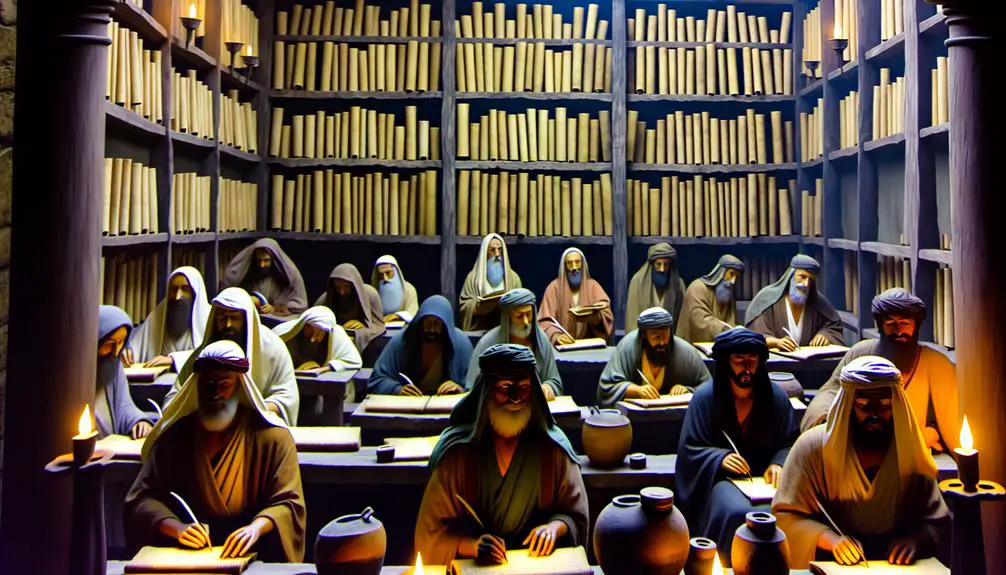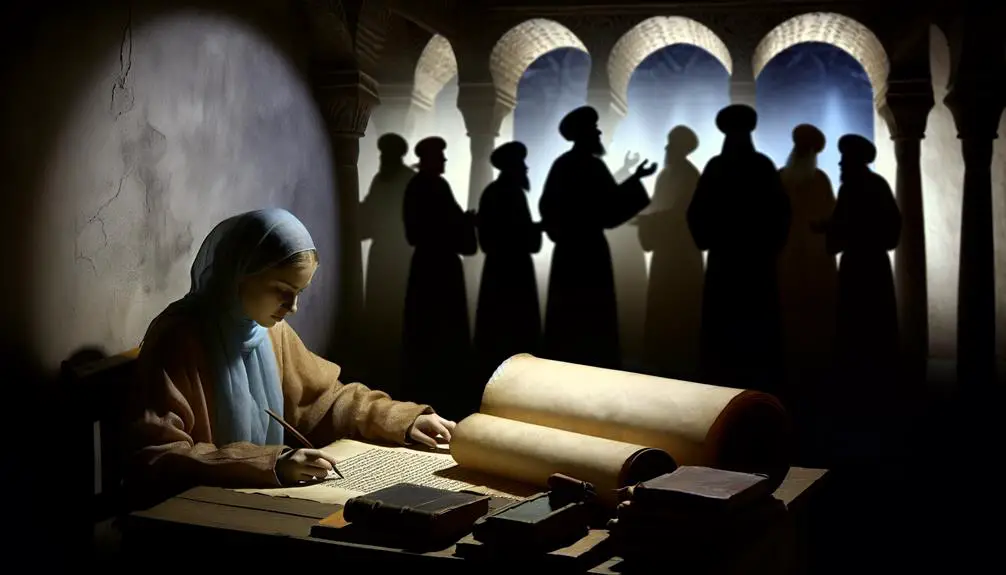Delve into the enigmatic world of Biblical scribes, whose sacred task shaped religious history and sparked controversies that echo to this day.

Meaning of Scribes in the Bible
Just as Hermes wielded his pen to etch the histories of gods, so too did the scribes of the Bible play a pivotal role in shaping the religious landscape. You might find yourself wondering about these ancient figures who meticulously transcribed texts, ensuring the preservation and transmission of sacred teachings.
Their influence spans beyond simple transcription; they were interpreters, educators, and, at times, controversial figures in their society. Unraveling the layers behind their contributions and the controversies that surrounded them offers a glimpse into a world where words wielded power.
Why their legacy matters in understanding modern scripture and its interpretation invites further exploration.
Key Takeaways
- Scribes played a critical role in preserving and interpreting religious texts in biblical times.
- Their meticulous work ensured the accuracy and integrity of scriptural documents for future generations.
- Scribes' unique position in society allowed them to significantly influence theological thought and religious practices.
- The evolution of scribing techniques from ancient to modern times continues to impact the accessibility and understanding of biblical scriptures.
Historical Role of Scribes

In ancient times, scribes played a pivotal role in the preservation and dissemination of texts, acting as the primary conduits through which the written word, including biblical scriptures, was transmitted across generations. You'll find their impact unparalleled, as they dedicated their lives to the meticulous task of copying manuscripts by hand. The scribes' education was rigorous, encompassing not only literacy in multiple languages but also a deep understanding of complex writing techniques. They mastered the art of precisely duplicating texts, ensuring that each letter and word was an exact replica of the original.
Their training involved learning various scripts and adapting to the materials available, from papyrus to parchment. The scribes' writing techniques evolved over time, incorporating innovations such as the use of ink made from soot or gallnuts. This expertise allowed them to maintain a high level of accuracy, which was crucial for preserving the integrity of religious and historical documents. Through their dedication, scribes ensured that the knowledge contained within these texts would endure, enabling future generations to access the wisdom of the past. Their role was foundational in the development of written culture, bridging the gap between the ancient and modern worlds.
Scribes in Religious Context
You must consider the scribes' sacred duties, which were pivotal in maintaining the religious texts' integrity and accessibility. Their scriptural contributions not only preserved ancient wisdom but also facilitated the interpretation and dissemination of religious doctrines.
Furthermore, the scribes' religious influence extended beyond mere transcription, shaping theological thought and practice within the biblical narrative.
Scribes' Sacred Duties
Scribes held paramount responsibilities in religious contexts, meticulously transcribing sacred texts to preserve the integrity and continuity of their spiritual traditions. Their role extended beyond mere transcription; they were guardians of divine communication, ensuring that each word was accurately copied and thereby maintaining the sanctity of the scriptures.
Aspect |
Detail |
Impact on Tradition |
|---|---|---|
Scribes' Attire |
Symbolized purity and devotion to their task. |
Reinforced the sacredness. |
Writing Techniques |
Employed precise, methodical approaches. |
Ensured accuracy and consistency. |
Material Preparation |
Selected and prepared parchments carefully. |
Preserved texts for generations. |
Ritual Purity |
Followed strict cleanliness codes. |
Maintained spiritual integrity. |
Education |
Underwent extensive training in languages. |
Guaranteed comprehension. |
Their duties, deeply embedded in their attire and writing techniques, underscored a profound commitment to their sacred tasks, embodying a reverence for the word of God.
Scribes' Scriptural Contributions
Beyond meticulously transcribing sacred texts, scribes made significant scriptural contributions that shaped religious practices and beliefs. Their dedication ensured not just the preservation but also the enhancement of religious texts. This influence is reflected through:
- Precision in Scriptural Accuracy: Scribes' rigorous methods guaranteed the fidelity of texts across generations.
- Development of Writing Techniques: Innovations in writing improved readability and interpretation.
- Standardization of Texts: Efforts led to uniformity in scriptural content, facilitating communal worship.
- Annotation for Clarity: Marginal notes and commentary provided essential context.
- Codification of Laws: Compiling and organizing laws made them more accessible.
Their work wasn't merely transcriptional; it was foundational, ensuring that the spiritual essence and doctrinal integrity of the texts were maintained for posterity.
Scribes' Religious Influence
In the realm of religious history, few roles have been as pivotal as that of the scribes, whose contributions profoundly shaped the practices and doctrines of their faith communities.
You'll find that scribes' attire wasn't just ceremonial; it served as a symbol of their revered status and dedication to their sacred work. This attire often distinguished them in society, visibly marking their role as intermediaries between the divine word and the people.
Furthermore, scribes' education was rigorous and comprehensive, underscoring their significance. They underwent years of meticulous training in languages, scriptures, and religious laws, ensuring that their interpretations and teachings were both accurate and enlightening.
This deep education not only bolstered their authority but also ensured they were pivotal in guiding the spiritual direction of their communities.
Scribes and Biblical Texts
Understanding the role of scribes is crucial when analyzing the composition and transmission of biblical texts. You need to grasp how their writing techniques and dedication to textual preservation shaped the scriptures we engage with today. Scribes were more than mere copyists; they were guardians of theological knowledge and played a pivotal role in ensuring the accuracy and integrity of the biblical texts through generations.
Consider the following points:
- Scribes meticulously applied specific writing techniques to maintain the consistency and purity of the text.
- They developed systems for textual preservation, including counting words and letters to ensure no alterations occurred.
- The training and education of a scribe emphasized memorization, which further safeguarded the scriptures from inadvertent errors.
- Scribes' reverence for the texts influenced their meticulous approach, ensuring that their work wasn't merely academic but a sacred duty.
- The evolution of writing materials and methods over time required scribes to adapt while still prioritizing the preservation of the original content.
Controversies Surrounding Scribes

Why have the actions and decisions of scribes throughout history sparked considerable debate and scrutiny among scholars and theologians? At the heart of these controversies is the belief that scribes, entrusted with the sacred duty of copying biblical texts, may have introduced alterations, whether intentionally or unintentionally. This concern isn't merely academic; it touches on the very integrity of the religious texts central to Judeo-Christian faiths.
Scribes' attire, often reflective of their societal and religious status, has also come under scrutiny. Critics argue that the elaborate nature of this attire could symbolize a deeper disconnect between the scribes' supposed humility and their actual social ambitions. This critique draws modern parallels to contemporary issues of authenticity and integrity among religious and academic figures.
To emphasize the complexity of these debates, consider the following table:
Concern |
Modern Parallel |
|---|---|
Textual Alterations |
Academic Integrity |
Scribes' Attire |
Public Image vs. Authenticity |
These controversies invite a deeper reflection on the role and responsibilities of those who wield significant influence over religious texts and teachings. They challenge us to consider how history, tradition, and modern expectations intersect and often clash, raising questions that remain as relevant today as they were centuries ago.
Scribes in Jesus' Time
As you examine the era of Jesus' ministry, it's crucial to understand the dual facets of scribes' influence: their social status and their religious roles.
Their elevated social position intertwined with their extensive knowledge of Jewish law, setting them apart in society and shaping their interactions with Jesus.
Analyzing their religious roles reveals how they were pivotal in interpreting and enforcing religious laws, often putting them at odds with Jesus' teachings.
Scribes' Social Status
During the time of Jesus, scribes held a position of considerable prestige within Jewish society, often revered for their expertise in the law and their role as teachers and interpreters of scripture. Their social status wasn't just a matter of honor; it was deeply intertwined with the education systems and economic contributions they provided to their communities.
- Integral to Education Systems: Scribes were essential in the dissemination of knowledge and literacy.
- Economic Contributions: Their skills in documentation and administration supported trade and commerce.
- Respected Educators: Seen as the intellectual elite, guiding religious and moral thought.
- Gatekeepers of Tradition: They preserved and interpreted sacred texts.
- Social Influencers: Their opinions often swayed public discourse and policy.
This multifaceted role ensured that scribes were central to both the spiritual and temporal spheres of Jewish life.
Scribes' Religious Roles
Interpreting and applying the laws of Moses, scribes played a pivotal religious role in Jesus' time, guiding the Jewish community through complex theological and ethical issues. Their expertise wasn't coincidental but the result of rigorous professional training, deeply rooted in literary techniques that were sophisticated for their time.
Aspect |
Description |
|---|---|
Professional Training |
Rigorous, encompassing study of texts, legal principles, and ethical considerations. |
Literary Techniques |
Advanced methods for interpreting texts, including allegory and symbolism. |
Legal Authority |
Entrusted with interpreting and applying Moses' laws. |
Ethical Guidance |
Provided moral and ethical counseling based on scriptures. |
Community Leadership |
Played a central role in guiding religious and social norms. |
These roles highlighted their indispensable function in society, bridging ancient texts with everyday life, ensuring continuity and coherence within the Jewish faith.
Impact on Modern Scripture

The role of scribes in ancient times has significantly influenced how modern scripture is interpreted and understood. You'll find that the meticulous processes they developed for copying texts have paved the way for principles of accuracy and reverence that guide digital transcription today. This has a profound effect on scriptural accessibility, making sacred texts available to a much wider audience than ever before.
- Digital Transcription and Preservation: Modern technology owes its precision and reliability in scriptural transcription to ancient scribing techniques. The dedication to preserving the integrity of texts has transitioned into digital formats, ensuring that the scripture remains untouched by time.
- Enhanced Scriptural Accessibility: The efforts of ancient scribes have indirectly led to the wide availability of scriptures online, enabling people from all walks of life to access sacred texts anytime, anywhere.
- Analytical Tools for Study: The methodologies developed for interpreting texts now benefit from digital tools that allow for deeper analysis and understanding of scripture, inspired by the analytical approach of ancient scribes.
- Educational Resources: The legacy of scribes has contributed to the development of extensive educational materials that help in understanding the context and meaning of scriptural passages.
- Preservation of Languages and Dialects: The meticulous recording of scriptures has aided in the preservation of ancient languages and dialects, providing valuable insights into the cultures from which they originated.
This intricate web of influence showcases the enduring legacy of scribes in shaping the way modern scripture is interacted with and appreciated.
Lessons From Ancient Scribes
Reflecting on the enduring legacy of ancient scribes illuminates valuable lessons for today's scholars and practitioners in the fields of textual preservation and analysis. You'll find that their meticulous writing techniques aren't just historical artifacts; they're methodologies ripe for adaptation and application in modern contexts.
Ancient scribes developed a profound understanding of the materials they worked with, from the preparation of papyrus or parchment to the composition of inks, demonstrating an early form of material science that you can apply to the preservation of contemporary documents.
Moreover, their educational methods, characterized by rigorous apprenticeships and the memorization of vast texts, underscore the importance of dedication and depth in learning. This approach teaches you the value of immersive study and the cultivation of a disciplined mind, qualities that are increasingly rare in an age of instant information and digital distractions.
Frequently Asked Questions
How Did the Daily Life and Routine of a Biblical Scribe Differ From That of Other Professions in Ancient Times?
As a scribe, your daily life was distinct from other professions. You'd spend long hours in scribe training, mastering complex writing materials like papyrus and ink, unlike craftsmen or farmers.
Your routine was more sedentary, focused on preserving texts and records. While others toiled outdoors, you were indoors, engaged in intellectual labor.
This meticulous work set you apart, highlighting the unique skill set and dedication required to maintain and transmit knowledge in ancient times.
Were There Any Notable Female Scribes Mentioned in the Bible or Historical Records From Biblical Times?
You're diving into a world where ink and parchment symbolize power and knowledge. When exploring gender roles and historical accuracy, it's clear that the Bible and ancient records seldom mention female scribes. This scarcity reflects societal norms and the roles deemed acceptable for women at the time.
Analyzing these texts, you'll find that, while contributions by women were significant, their acknowledgment in roles like scribing was minimal, underscoring a gap in historical representation.
How Did the Role and Perception of Scribes Change From the Old Testament to the New Testament Era?
In transitioning from the Old Testament to the New Testament era, you'll notice scribes' roles and perceptions evolved significantly. Initially, their education and attire marked them as learned elite, entrusted with preserving texts and laws.
However, by the New Testament times, their scholarly status often led to critiques of their integrity and intentions. This shift reflects broader societal changes and challenges in interpreting religious and legal texts, underscoring the complexity of their evolving roles.
In What Ways Did Scribes Interact With or Influence Political Leaders and Kings in the Biblical Period?
You'd think scribes were just ancient pen pals, but their role was far juicier. They were the brains behind writing techniques that shaped royal decrees, subtly influencing the political landscape.
How Has Modern Archaeology and Scholarship Revised Our Understanding of Scribes' Work and Their Contribution to Biblical Texts in Recent Years?
You've likely noticed how modern archaeology and scholarship have reshaped our view of scribes' roles in creating biblical texts.
Recent studies delve into scribes' attire and writing materials, offering insights into their daily lives and work processes.
This fresh perspective helps us understand the meticulous care and cultural practices behind the texts.
It's fascinating to see how these discoveries challenge traditional views, highlighting the scribes' significant contribution to religious and historical documents.
Conclusion
So, after delving deep into the world of ancient scribes, you've probably realized they were the original influencers, shaping religious texts with the stroke of a quill.
In Jesus' time, they were the spiritual elite, yet often found themselves at odds with the man himself.
Fast forward, and their influence still echoes in modern scripture. It's almost as if these ancient text tweakers knew that centuries later, we'd still be deciphering their edits.
Who knew penmanship could hold such power?



Sign up